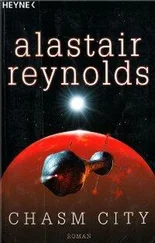‘Did you remember to book ahead?’ Jitendra asked.
‘It’s a Thursday,’ Sunday said. ‘It won’t be heaving.’
Down in the congested lower levels Geoffrey made out bustling traffic, electric vehicles shuffling through near gridlock like neat little injection-moulded game pieces. There were cyclists and rickshaw drivers and piggyback robots. Human and mechanical motion, everywhere.
Sunday led them across a black ironwork bridge. It carried a wooden-floored promenade with perilously low railings, interrupted here and there by booths and stands with striped canvas awnings.
‘That’s the Turret,’ she said, indicating the structure at the other end of the bridge. ‘Best views of the cavern. Hope you’ve worked up a good appetite.’
Inside the Turret it was all organic pastel-coloured forms, enlivened with glass and porcelain mosaics set into umber-coloured stucco. Sunday had led them directly to a window alcove shaped like some natural cavity worn away by subterranean water erosion. Only after several minutes of dutiful observation was Geoffrey able to confirm that the view was creeping slowly past. Sunday told him that the machinery making the restaurant revolve had been repurposed from an abandoned centrifuge. The bearings were so icily smooth it felt as if the rest of the universe was doing the turning.
He was on one side of the table, Sunday and Jitendra on the other. Sunday had ordered a big bottle of Icelandic Merlot before Geoffrey had even put his bag down, wasting no time in charging their glasses. They made small talk over the appetisers, Sunday pushing him on his current romantic entanglements, or lack thereof, asking him if he had heard from Jumai lately. He told her that Jumai had chinged in on the day of Eunice’s death.
‘Sounds very exciting, what she’s doing. And quite dangerous,’ Sunday said.
‘They pay her well,’ Geoffrey said.
Ordinarily he’d have been uneasy talking about an old girlfriend, but at least it kept them off the one topic he didn’t want to go anywhere near.
‘More wine?’ Sunday asked, when the waiter came to take away their empty appetiser plates.
Jitendra levelled a hand over his glass. ‘Need a clear head tomorrow. Robot Wars.’
Geoffrey looked blank.
‘Jitendra’s a competitor,’ Sunday said. ‘It’s a thing he does. We’ll go out and see it tomorrow, the three of us.’
‘Something to do with free energy?’ Geoffrey asked, keen to latch on to a topic that would keep them off the real reason for his visit.
‘Something else entirely.’ Jitendra lowered his voice, as if he was in dread danger of being overheard by the other diners. ‘Although June Wing will be there, I think.’
‘You work for Plexus?’ Geoffrey asked, recognising the name.
‘I do work for them,’ he said, making the distinction plain. ‘They pay me to have interesting ideas, while at the same time recognising that I could never function in an orthodox corporate environment. They also give me far more creative latitude than I’d ever get working full-time in their labs. The upside is I don’t really have deadlines or deliverables. The downside is I don’t get paid very much. But we can afford to live where we do and I have a twenty-four-hour hotline to June that some people would kill for.’
‘So this… free-energy thing – is that a Plexus research programme?’
‘Not officially, because the whole point of free energy – at least in the sense that I’m interested in it – is to create human-level artilects. And that’s obviously a fairly major no-no, even now.’ Jitendra scratched at his dark-stubbled scalp. ‘But unofficially? That’s a different kettle.’
‘We found one once,’ Geoffrey said. ‘Near our home. It tried to take over Sunday’s mind.’
‘She told me about that. What you encountered was an abomination, a military intelligence. It was designed to be insidious and spiteful and inimical to life, and it wasn’t smart enough to have a conscience. But artilects could work for us, if we make them even cleverer.’
When the waiter arrived with their main courses there was the usual minor confusion over one of the orders. Geoffrey suspected that this reassuringly human touch was now firmly embedded in the service.
‘Maybe that’s not as easy as it sounds,’ he said, ‘making machines smarter.’
‘Depends where you begin.’ Jitendra was already tucking in. ‘Seems self-evident to me that the best starting point would be the human mind. What is it, if not a thinking, conscious machine that the universe has already given us, on a plate?’
A queasy image of a brain, served up with salad and trimmings, intruded into Geoffrey’s thoughts. He shoved it aside like an undercooked entrée.
‘Animal cognition, there’s still work to be done. But the human brain? Isn’t that a done deal, research-wise?’
Jitendra pushed his food around with enthusiasm. ‘We know what goes on in a mind. We can track processes and correlate them at any resolution we care to specify. But that’s not the same as understanding.’
‘Until,’ Sunday said, ‘Jitendra comes along, with his world-shaking new ideas.’
‘I’d take credit for them if they were mine,’ Jitendra said. He inhaled a few hasty mouthfuls while holding up his knife to signal that he was not yet done talking.
Geoffrey decided that he rather liked Jitendra. And while Jitendra was talking, he didn’t have to.
‘Point is,’Jitendra continued, swallowing between words, ‘I’m not just doing this out of some deluded sense that the world gives a damn about a theory of mind. What it cares about are practical applications.’
‘Hence the Plexus connection,’ Geoffrey said.
‘You’ve seen the claybot. That’s the physical edge of things. There’s also the construct, which Sunday has been involved with at least as much as me.’
‘The construct?’
‘Later,’ Sunday said, smiling.
‘And ultimately… there’s a point to all this?’ Geoffrey asked.
‘We need better machines. Machines that are as smart and adaptable as us, so they can be us – or go places we can’t,’ Jitendra said.
Geoffrey’s expression was sceptical.
‘Look, you’re going to meet the Pans at some point,’ Jitendra went on. ‘They’re our friends, and they have one point of view, which is that only people ought to be allowed to go into space. The flesh must inherit the stars; anything else is treason against the species. On the other side of the debate, you’ve got hard-line pragmatists like Akinya Space who will always send a machine to do a human’s work if it’s cheaper. That’s why you’ve got umpteen billion robots crawling around the asteroid belt.’
‘We’re having dinner in a restaurant on the Moon,’ Geoffrey said. ‘Isn’t it a bit late to be worrying about who gets to go into space?’
‘The reckoning’s not over, it’s just postponed,’ Jitendra answered. ‘But the Pans are growing in strength and influence, and the industrialists haven’t suddenly backed off from their dollar-eyed conviction that robots make the most sense. Sooner or later, heads are going to bash. Not around Earth or the Moon, maybe, but we’re pushing into deep space now – Trans-Neptunian, the inner boundary of the Kuiper belt, and we’ve even got machines in the Oort cloud. That’s where it gets stickier. If we’re going to do anything useful out there, we’ll need smart machines and lots of them. Machines that break right through the existing cognition thresholds, into post-artilect computation. Human-level thinkers that can live with us, be our equals as well as our workers.’
‘You’re not sounding any less scary than you were five minutes ago,’ Geoffrey said.
Читать дальше












